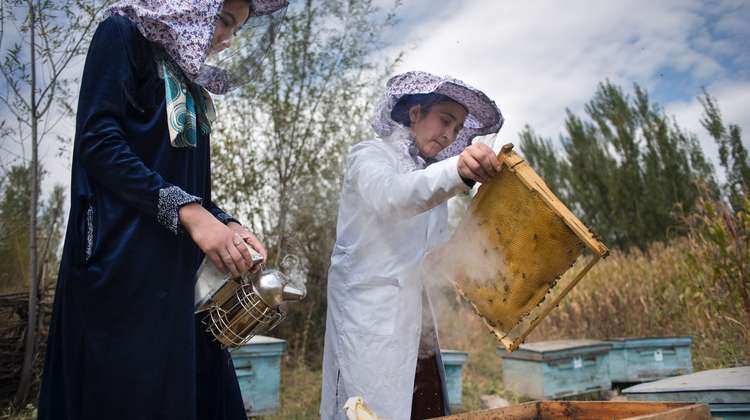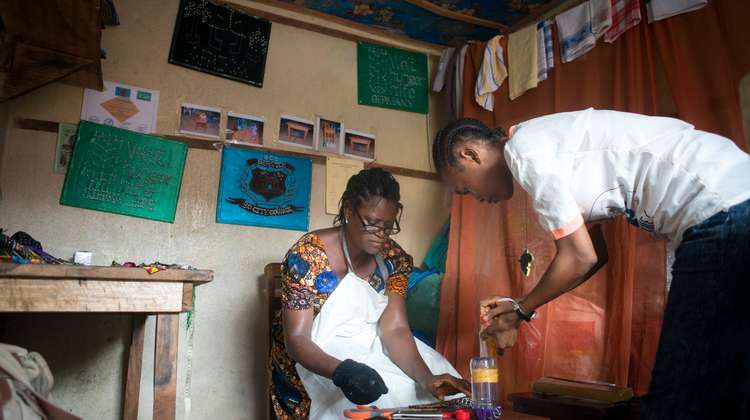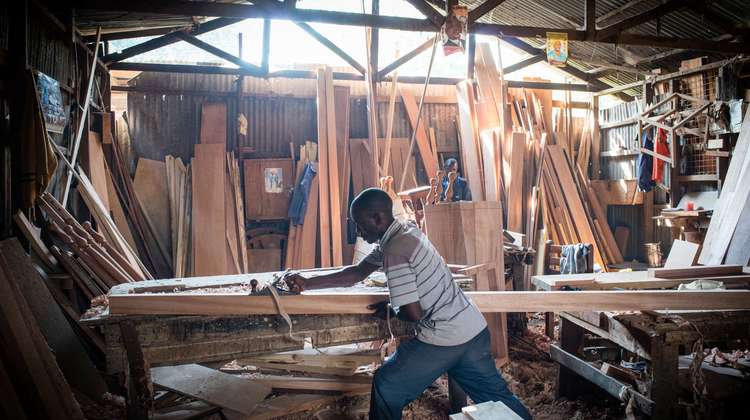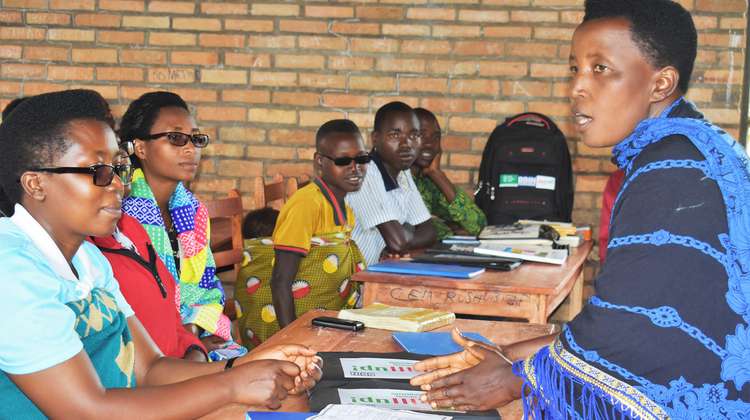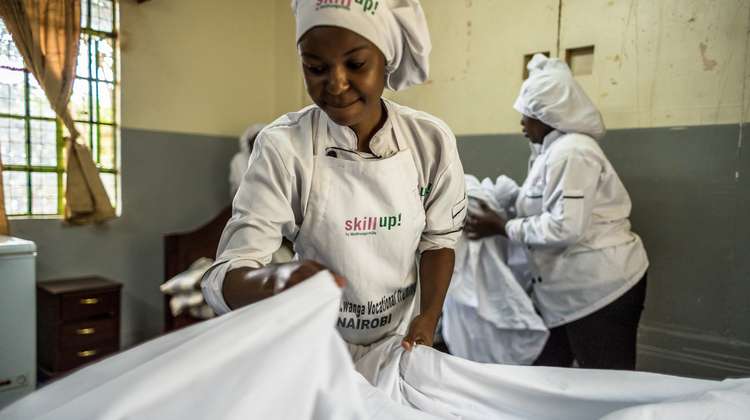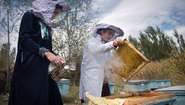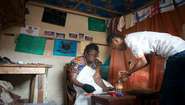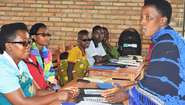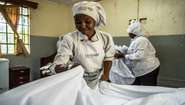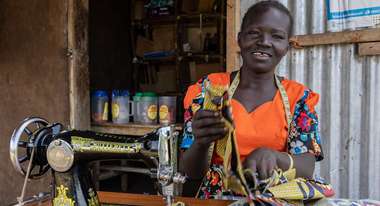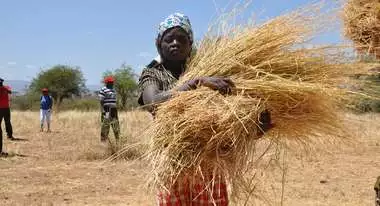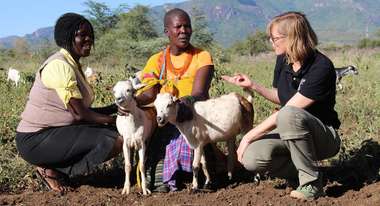“Skill Up!” training program
Job opportunities and a better life for trainees, trainers and their families.
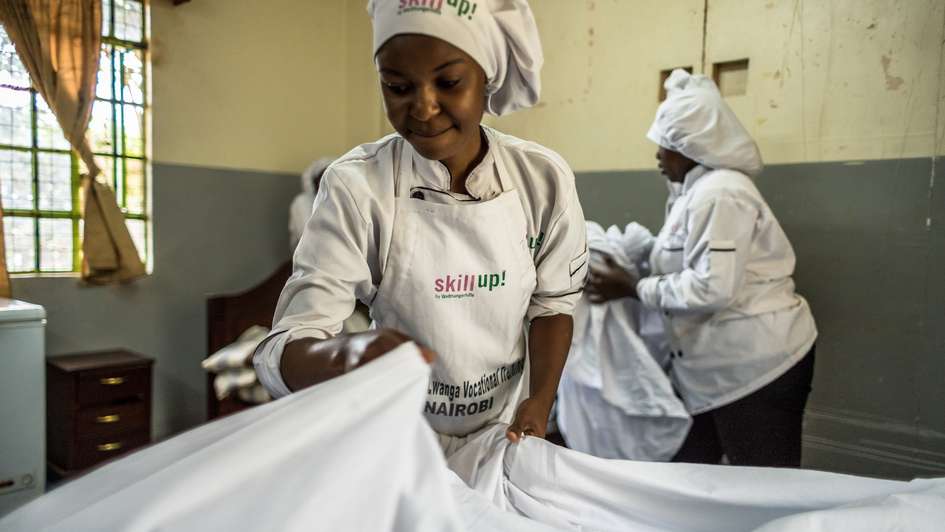
Fatoumata lives with her three children and husband in the town of Ségou in central Mali. As a young mother, Fatoumata often faces challenges as she has limited access to cheap and nutritious food.
She runs "Marta Briquettes," a company that produces environmentally friendly charcoal from plant residues such as wild shrubs, mango peels and seeds, and shea nut shells. The Skill Up! Project is supporting Fatoumata's business and 15 other local start-ups. Welthungerhilfe (WHH) is working with the local partner DoniLab, a promoter of innovative entrepreneurship.
Thanks to the comprehensive training Skill Up! offers, Fatoumata has expanded and improved her business skills, among other things. She can now better identify and approach customers, calculate her income and expenses accurately, and promote her products in an appealing way. Thanks to the increased revenue, Fatoumata can now employ four people, who can also better support their own families through their work, such as buying school materials and nutritious food for their children.
Education – the key to development
Amplified by the impact of the COVID-19 pandemic, 73 million young people between the ages of 15 and 24 are unemployed worldwide, according to the International Labor Organization. The number could continue to rise: In Africa alone, at least 150 million young women and men will enter the labor market by 2030. Training youth and building labor markets in poverty-stricken regions are crucial to development, economic growth, and the path out of hunger and poverty. In 2015, the cross-national program Skill Up! - qualify yourself! was launched on the initiative of Gudrun Bauer and developed in cooperation between Bauer Charity gGmbH and WHH.
The Skill Up! program offers around 25,000 young women and men between the ages of 15 and 35 the opportunity to gain professional qualifications. Following expansion in 2019, young people have earned qualifications through the Skill Up! program in Afghanistan, India, Kenya, Malawi, Nepal, Sierra Leone, Tajikistan, and Uganda.
Due to the remarkable successes in these countries, WHH helped expand the program again in 2022 to four additional French-speaking countries in particularly fragile contexts: Burundi, the Democratic Republic of Congo, Mali, and the Central African Republic. In addition to the central goal of bringing young people in these challenging contexts into profitable employment or self-employment, WHH aims further to develop the program-specific training approach through the expansion and adapt it for fragile, unstable contexts.
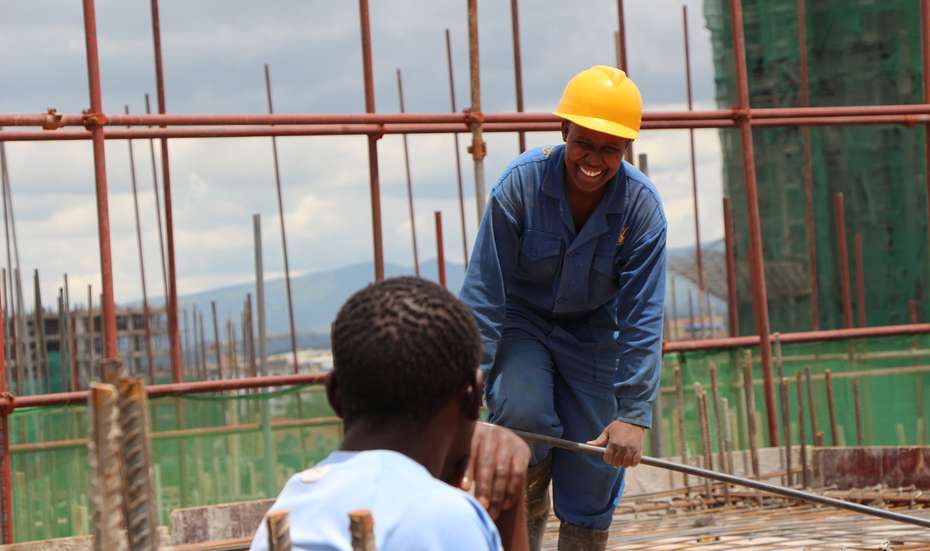
Good for the economy – and self-confidence
Skill Up! offers young people the chance to earn an income as entrepreneurs. The training programs in the individual countries are practical, needs-based, adapted to the respective location and aimed at young people – especially young women – who live under challenging conditions. In addition to manual skills, the trainees, like Fatoumata, acquire business basics and everyday skills such as reliability, assertiveness and teamwork. These so-called life skills strengthen the trainees' self-confidence, which is critical for their chosen career paths. At the same time, the program qualifies trainers, supports local companies, develops curricula and educational concepts, and strengthens government structures so that the projects can run on their own in the long term.
The Skill Up! projects by country
- Afghanistan: The program allows young women in particular, who often have restrictions imposed on them, to receive training in silk cultivation and production and saffron cultivation and marketing. This enables them to generate an independent income for themselves at home. WHH and a local partner organization will train around 2,450 women in three districts.
- Burundi: The program trains 750 young women and men in three different training centers in rural northern Burundi. The training includes theoretical and practical learning and support through a mentoring program. Training covers various occupational fields, including agriculture and livestock, construction, carpentry and sewing.
- Central African Republic: In cooperation with existing private training centers, the project is training 2,800 young people. Mobile short-term training courses are used to offer young people in more remote parts of the country training opportunities. Due to the sometimes fragile situation in the country, the project pays special attention to strengthening social cohesion in all activities.
- Democratic Republic of Congo: Around 250 young people, some of whom have had to flee their regions of origin, will receive both training and access to financial support under the project to boost their entrepreneurship, as well as mentoring to promote the success of their businesses and jobs beyond the life of the project.
- India: In the Green Colleges, WHH advises and supports smallholder farmers through training courses focusing on sustainable agriculture, and improving access to new technologies, markets and financial institutions. The program is training a total of 2,150 people in India.
- Kenya: The program provides training for around 800 young people in workshops and private companies, in areas like automotive mechanics, electrical engineering, catering, hairdressing, ICT-Information and Communication Technology and agriculture.
- Malawi: 285 young women and men in the Dzaleka refugee camp and rural areas of Malawi receive state-recognized training. They can find suitable employment or become self-employed using the acquired skills and capabilities.
- Mali: Around 1,500 young people are to receive training, particularly in "green professions" such as organic farming, waste management, the renewable energy sector, and digital innovations in the agricultural industry. This training will also bolster young entrepreneurs who are already active and lack the skills to implement their businesses profitably.
- Nepal: Young generations are being given the opportunity to work in the “green sector,” for example in sustainable food production. The best of the approximately 3,000 graduates with bright ideas will be supported in setting up their own businesses and will be trained as “ecopreneurs”.
- Sierra Leone: Nearly 3,000 trainees receive training in technical and entrepreneurial skills. Mobile training teams organize needs-based courses in solar energy, miller utilization, irrigation and agriculture.
- Tajikistan: The aim is to teach manual, commercial and entrepreneurial skills. 750 young adults are receiving three months of training through the project to help them establish their own businesses.
- Uganda: The trainees are taught in artisanal enterprises and receive on-campus instruction in self-management and commercial skills. The training program is reaching a total of 300 young people in Uganda.





